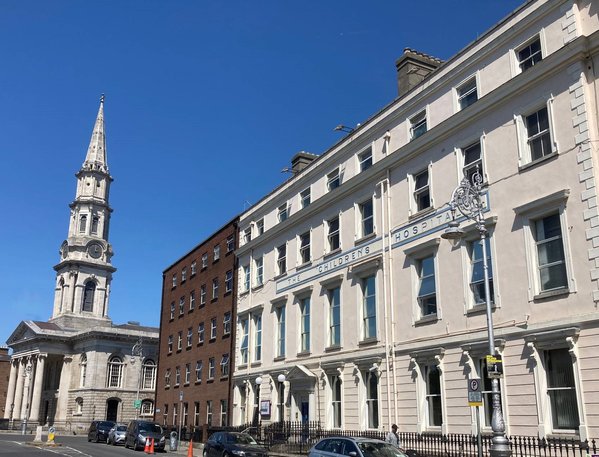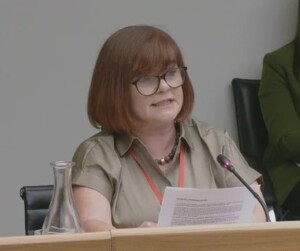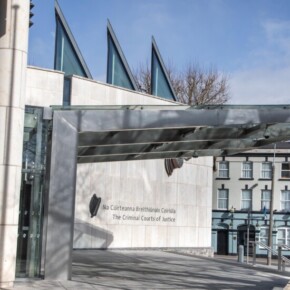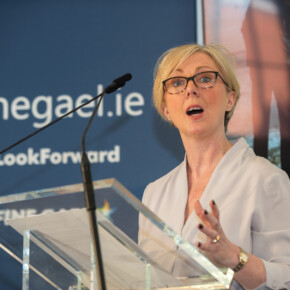Betrayal of trust at CHI
Padraig Conlon 25 Jun 2025
Children’s Health Ireland has admitted it failed to inform families about serious risks to their children’s health, including cases where delayed surgery may have left young boys infertile, in what Oireachtas members are calling a “systematic failure” of paediatric care.

CHI chief executive Lucy Nugent (pictured above) delivered a public apology during a heated appearance before the Joint Oireachtas Committee on Health last Thursday (19th), acknowledging that trust in the national children’s hospital system had been badly damaged.
“I am sorry on behalf of the management of Children’s Health Ireland and I am sorry on behalf of the entire organisation,” she told TDs and senators.
“I am very aware that various issues that my organisation is grappling with have an enormously worrying impact on parents around the country, and whether they can place their trust in us.”
But the remorse did little to quell growing public anger as it emerged that families of affected children were never told about major failings, failings detailed in multiple internal reports going back several years.
Among the most serious revelations was that some boys with undescended testes waited far beyond the recommended timeframe for surgery, despite faster treatment being available.
A 2021 unpublished internal report found these delays could lead to infertility or cancer, yet the families were not informed.
Pressed by Sinn Féin health spokesperson David Cullinane, Ms Nugent said the cases “did not meet the threshold for open disclosure.”
That response sparked outrage from the committee.
Senator Tom Clonan, a long-time advocate for disability rights, called the situation “shocking,” and accused CHI of allowing children, particularly those with disabilities, to suffer needlessly.
“That’s not a mistake,” he said. “That is an ongoing systemic and systematic failure of our children, disabled children, being de facto sterilised for lack of intervention, on your watch.”
The committee also heard details from a separate 2021 report that described children with spina bifida at Crumlin and Temple Street as “Crumlin Orphans” and concluded they had received “sub-optimal care.”
Mr Cullinane read from the report, which stated: “Patients in both Temple Street and Crumlin have been neglected and have not received the level of care which would be expected in the modern day in a country with developed healthcare.” Thirty-four families were identified as being at the centre of this report. None were informed.
“That is a failure that families were not notified,” said Mr Cullinane.
CHI’s failings extended to oncology services too.
A risk assessment of its paediatric cancer unit in August 2021 gave it a score of 20 out of 25, classifying it as high-risk.
The report stated that patients were at risk of harm due to CHI’s inability to meet international standards.
When asked whether the families of children being treated there were ever told, Ms Nugent replied: “Not to the best of my knowledge.”
The hearing, which featured several senior figures from CHI’s clinical leadership as well as HSE officials, painted a bleak picture of paediatric care failures and a worrying culture of silence around disclosure.
Ms Nugent insisted that the organisation wants only the best outcomes for children and admitted that in many cases, “trust is broken.”
A more recent controversy, the audit into hip dysplasia surgeries at Temple Street and Cappagh, also came under scrutiny.
That review found that 79 percent of children who underwent the surgery at Cappagh, and 60 percent at Temple Street, did not meet the required clinical threshold.
Some committee members questioned whether private medicine may have influenced the number of surgeries carried out.
Ms Nugent denied that financial incentives were a factor, stating that around 25 to 26 percent of the children treated were private patients, a figure she described as within “contractual norms.”
CHI has launched a lookback review of all hip dysplasia surgeries carried out since 2010.
Roughly 2,200 children had such procedures over that time period, but only 60 have been seen so far as part of the review.
CHI said 105 appointments have been offered, with 73 children currently booked in. Some families, they said, had to cancel for personal reasons.
Clinical director Dr Ike Okafor confirmed that around 1,800 osteotomy cases dating back to 2010 are now being reviewed.
So far, 72 of those children have been reassessed. CHI hopes to complete the majority of the reviews within six months.
Ms Nugent added that future hip surgery cases would be examined by a multidisciplinary team to ensure consistency and safety across all CHI hospitals.
The hearing also focused on staffing and governance ahead of the long-awaited move to the new National Children’s Hospital.
Ms Nugent told the committee that 576 full-time staff would be required when services at Temple Street, Crumlin, and Tallaght are consolidated.
This is significantly higher than the 382.8 staff positions requested three years ago. Labour TD Marie Sherlock questioned the revised estimate.
Ms Nugent said the new number has “not yet been agreed” with the HSE or the Department of Health.
There was one sliver of improvement noted: the number of children waiting over four months for spinal surgery has dropped to 48 since the beginning of June.
CHI reported that 223 spinal operations have been performed so far this year, compared to 196 at the same point in 2024.
A new consultant orthopaedic spinal surgeon is set to begin work in August, with recruitment under way for three more.
Still, many families say the damage is done.
For those whose children were caught up in the delays, denials, or inappropriate surgeries, there has been no clear path to resolution, just more apologies, more audits, and more unanswered questions.
Ms Nugent pledged to rebuild public confidence.
But as Senator Clonan reminded the committee, this was not a one-off scandal.
“These are not isolated mistakes,” he said.
“These are patterns of institutional neglect. And children are paying the price.”











